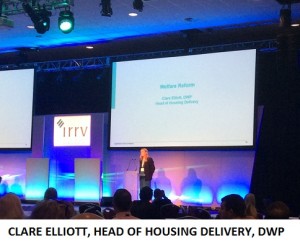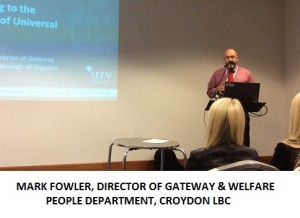Universal Credit and Welfare Reform were well represented topics at the IRRV annual conference in Telford, with updates from the DWP and some insights from Councils currently in the process of rolling it out.
 The cost of managing Housing and Benefits
The cost of managing Housing and Benefits
Clare Elliott, Deputy Director from the DWP gave an update on Welfare Reform noting that the annual managed expenditure for administering and managing housing benefits alone was around £24 billion. With many people being dependent on it being administered correctly to avoid homelessness.
Clare noted that Housing Benefits expenditure has increased significantly due to house price increases and the recession. Although it appears to be plateauing now expenditure is effectively being driven by case load which has seen a 15% increase in the last five years as well as the cost of the benefit.
Clare also commented that whilst there had also been a large increase in the delivery of discretionary housing payments, that around 20-30% of authorities still don’t spend the budget allocated for this and questioned why this was the case.
The speed of processing Housing Benefits has improved, thanks to general improvement of services however fraud and error in this area continues to increase, with fraud accounting for 6.1%. Although this fraud figure is relatively low in comparison to other benefits, it is believed one of the main reasons driving figures up is down to delays in people reporting changes in circumstances such as earnings and changes in employment status.
When it comes to the recovery of debt in Housing Benefits, the amount written off in 2014/15 has risen significantly from 2013/14 going from £74.4M to £93.9M an increase of around 26%.
The vision for Universal Credit
Clare also commented on the slow, steady and controlled roll out of Universal Credit emphasising its purpose in creating independent self-sustaining people focused on looking for work. The vision over the next five years was to create a fairer system with families on benefits able to make the same financial decisions as those in work. The aim for Universal Credit roll out is to have it in all job centres by Spring 2016 with a full digital service in place by April or May of next year.
Clare felt that there were opportunities for improvement when it came to automating data sharing as well as making the ability to inform of changes in circumstances easier. Partnerships are also a crucial part of Welfare Reform as well as digitalisation and the ability to better streamline processes.
 Universal Credit Roll Out at Hackney LBC
Universal Credit Roll Out at Hackney LBC
We also heard from Jennifer Wynter, Head of Benefits at Hackney London Borough Council (LBC) on how they are dealing with the Universal Credit roll out. Jennifer noted that she has a hugely diverse borough and deals with 110,000 households of which 50% were claiming benefit or council tax reduction.
A partnership was set up in 2010 consisting of libraries, social care, public healthcare and the largest landlord, which is the Council responsible for 22,000 homes. The partnership approach works she says, they have an action plan and report on it every 6 months to both the Cabinet and the Mayor. There has been internal reorganisation of staff including her own role incorporating not just Head of Benefits but also Housing. The goal of the partnership has been to minimise and prevent homelessness rather than focus on employment.
Jennifer notes they are not yet live with Universal Credit, they go live at the end of March but have had one Universal Credit claim already which has proven hugely complex and calling upon the resources of many different agencies. In terms of the financial impact of Universal Credit on Hackney their claimant base accounts for around £10m and as an expense accounts for around £2m per year. They do see Universal Credit as an opportunity, Job Centre Plus works well with them, but it needs more in set up costs and core funding. The key will be in embedding Universal Credit into local services with a priority on keeping people calm, ensuring nobody panics, particularly in the case of private landlords.
 Universal Credit Roll Out at Croydon LBC
Universal Credit Roll Out at Croydon LBC
Mark Fowler, Director of Gateway & Welfare People Department at Croydon LBC also provided some insights into responding to the challenges of Universal Credit in Croydon. He noted that the North of the borough has high levels of deprivation whereas the South is affluent which does provide some complexities with service provision. Croydon has 42,000 housing benefit and council tax customers and they went live with Universal Credit in July. Since go live they have had 383 claims of which 221 had housing costs associated. He did note a reduction of 0.5% in housing benefit caseload since go live and forecasts that by end of February 2016 they will have 1,839 live housing claims. They are currently preparing residents for change and supporting them with personal budgeting.
As part of their roll out they launched a gateway service, working in a shared office with DWP and Job Centre Plus employees. Benefits was one of the first services to go live and they identified 16,000 customers who would be impacted and segmented the top 500 who would lose the most per month and proactively contacted them. They assisted a further 5,500 customers by offering a different solution and collectively focussed on reducing evictions and increasing collections.
Cases were ranked high, medium and low and they found that most customers needing help had a high level of arrears. Mark flagged some future risks and issues to be aware off; housing pressures will continue, the future of Discretionary Housing Payment is unsure, but use up the budget while you have it. He also noted the issue of not being notified of changes in circumstance and the need for better data sharing with the DWP to help address this. He also commented on the lack of information on tenants who have alternative payment arrangements in place and when a Universal Credit case is capped that Councils will not be advised of this.
Marks final words of advice on the topic; segment your customers and assess the impact to identify who you can help. If you can bring services together do it – such as benefits and housing. Understand and articulate the risks of homelessness, rent and council tax arrears. Monitor the impact and forecast, so if another 500 people become homeless understand what the cost of this will be.
